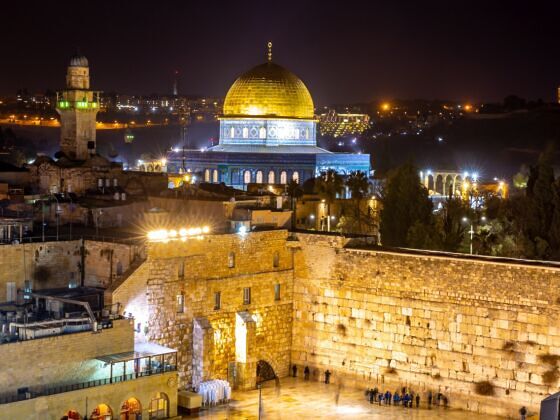LINDA ZISQUIT AND I had exchanged emails for almost half a year, so we’d already touched down many times in each other’s lives. When I began reading her poetry, I would sometimes stop to look at her book jacket photos. Ritual Bath, her first book, shows her with arms crossed, head tilted, a cheerful smile that seemed to belie her feral word portraits.


When war broke out I was unloosed.
Whatever I believed, forgotten.
The ark that held us shattered,
leaving no links intact.
You turned to wave.
I waited for any man to knock at the door.
~ from “Summer At War”
Her emails to me mentioned five children, nine grandchildren, a husband of 43 years (Donald was breaking loose from his wife with a sign welcoming me to Israel), halibut with garlic sauce for their Sabbath meal. Confusion is a delicacy I find irresistible.
“I used to describe my poems,” she once told me, “as being written in the cracks of my life.”
Her face floating towards me, tired but happy, held the irony of the moment. She herself journeyed here from Buffalo thirty years ago, at age 33. A journey to a new language as well as a new country — like my journey to her poetry, which began when another poet emailed me her name. I was drawn to it because it was such an unusual name, and it began with a Z. I have an attraction to last things.
Exploring the land of Linda’s poetry (it is not a vast country productively, four slender volumes* spread out over her 63 years), I lost myself in the unknown, the reason one travels in the first place.
I loved her short poems in part because so much space went into holding so few words. Sometimes the space is a desert, sometimes an ocean.
In her poem “Hide & Seek” from Unopened Letters, it is an ocean:
When you left
this empty space
the world emerged.
Eat and laugh!
Or catch a ram
in the thicket.
Her Biblical poem “Amnon,” from the same anthology, disappears into desert:
I’ve had her, she’s nothing.
Lay her damp on the quilt-
covered floor, pant, chasten her
with love, she’ll get up in ashes.
“The Biblical sources,” she said, “speak to me about life, about our lives. I always find something there that connects me to what I am struggling with.”
Riding in their car to Jerusalem, where Linda found a place for me, I did not look out the window once. I was too deep in conversation to recall my dread of being flung into the ghostly expanse of countryside linking some nocturnal airport with a distant city.
“You are always writing about interior geography,” I said in one of my interviews with her. “The geography of the emotions. You don’t write that much about Israel, even though you have been here for so long and raised all of your children here.
“Maybe I am an escapist,” she laughed.
She was at first an unwilling immigrant. “I didn’t want to leave Creeley (her poet friend and mentor). I didn’t want to leave my parents. I was torn down the middle. An uncomfortable state (she went for her husband’s sake), but the state of something very alive.”
I think of my own country, which I always want to leave, in which I always feel uncomfortable, and the shocking bursts of energy that estrangement from America always gives me.
“I live in Israel with great love. I wouldn’t want to live anywhere else.”
But where are the poems?
There are beautiful poems about Israel in her work. “Burning The Bridges” (from Ritual Bath) is, in part, a brooding Israeli nature poem:
Jasmine lingers in the parapets.
Doors creak open in a dull wind.
Birds rise in swarms
then freeze in the yellow sky.
For me, Israel was always someplace else when I visited the poet in her old renovated house with its garden of pear and loquat trees. When it entered, it entered as poetry’s guest.
* Ritual Bath 1993, Unopened Letters 1996, The Face In The Window 2004, Ghazal Mazal 2011